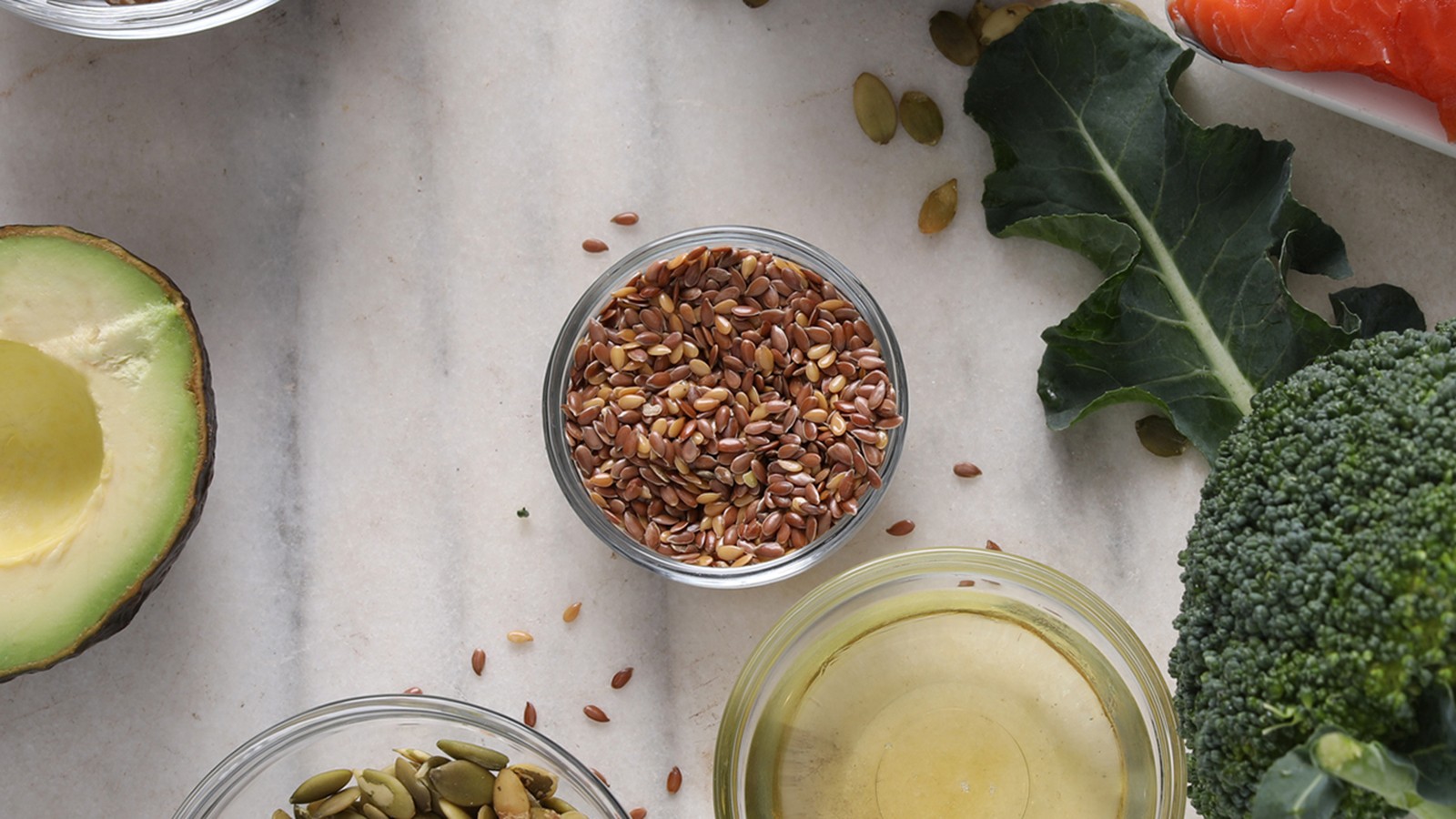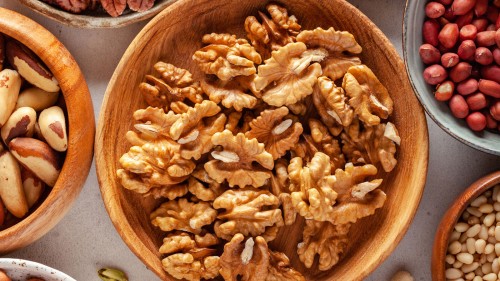5 Health Benefits of Flaxseeds and Tips for Using Them in Your Diet
Published on April 6, 2022
Medically Reviewed by Natalie Olsen, MS, RDN
Flaxseeds come with many health benefits, including helping you balance your blood sugar, manage your weight, fight inflammation, and more. Since they are so versatile, there are many different ways to include them in your diet.


Flaxseeds are a healthy food that can fit into almost anyone’s diet. They have gained popularity in recent years thanks to their many health benefits and ways of using them.
Keep reading to learn about what flaxseeds are, their top five health benefits, and tips for buying and using them in your diet.
What Are Flaxseeds?
Flaxseeds are seeds that come from the flax plant. They are a light brown or golden color and resemble rice.
Flaxseeds can be eaten in whole or ground form. The ground form is also called flaxseed meal, and it is more common than whole flaxseeds.
Ground flaxseeds are easier to digest. They also provide more nutritional benefits than whole seeds as they are higher in omega-3 fatty acids. (1)
Both ground and whole flaxseeds are commonly found in most grocery stores and online markets. If you cannot find pre-ground flaxseeds, you can always grind them yourself using a blender, food processor, or coffee grinder.
Summary
Flaxseeds are small seeds that come from the flax plant. They are often ground to create flaxseed meal, which is easier to digest and may be more nutritious than whole flaxseeds.
Are Flaxseeds Good for You?
Flaxseeds provide a lot of nutrients in a small amount. Just 2 Tbsp (14 g) of ground flaxseed provides the following: (2)
- Calories: 74
- Carbohydrates: 5 g
- Fiber: 4 g
- Sugars: 0 g
- Protein: 2.4 g
- Fat: 6 g
- Saturated Fat: 0.5 g
- Iron: 0.8 mg (6% daily value)
- Potassium: 168 mg (4% daily value)
- Phosphorus: 90 mg (8% daily value)
- Zinc: 0.6 mg (6% daily value)
- Magnesium: 54 mg (14% daily value)
- Thiamine (Vitamin B1): 0.23 mg (20% daily value)
- Selenium: 3.5 mcg (6% daily value)
On a separate note, it is important to know that flaxseeds contain a compound called phytoestrogens.
Phytoestrogens are plant compounds that mimic the structure of estrogen, a main female sex hormone.
For this reason, people on hormone therapy or with hormone-sensitive condition, including certain cancers and pregnancy, should talk with their doctor before adding flaxseed to their diet. (3)
Summary
Flaxseeds provide many important nutrients, including plant-based protein, unsaturated fats, and small amounts of many vitamins and minerals like iron, thiamine, and magnesium.
Flaxseeds also contain a plant compound that can mimic estrogen. People with hormone-sensitive conditions should talk to their doctor before increasing the amount of flaxseed in their diet.
Health Benefits of Flaxseeds
There are many health benefits of eating flaxseeds, including:
Good Source of Healthy Fats, Including Omega-3s
Almost all of the fat in flaxseeds comes from unsaturated fats, which are healthier than saturated. Some of the unsaturated fat is a type of polyunsaturated fat known as omega-3.
Most omega-3 fats come from animal foods like fatty fish, but flaxseeds are one of the richest plant sources of these essential fats. (3)
Omega-3 fats benefit your health in many ways, such as helping to lower the levels of inflammation in your body that can otherwise lead to disease. This is why they are known as anti-inflammatory fats.
However, the type of omega-3 fats in flaxseeds is different from those found in fish.
Flaxseeds provide a type of omega-3 called alpha-linolenic acid, or ALA.
ALA must be converted into the active forms of EPA and DHA omega-3s in order to be used by your body.
Therefore, flaxseeds aren’t as good of a source of omega-3 fats compared to animal sources, but they can still provide similar health benefits.
They are an especially great option for people who follow vegetarian or vegan diets.
May Help Promote a Healthy Digestive Tract
Flaxseeds are a great source of dietary fiber.
A 2-Tbsp serving of ground flaxseeds provides 4 grams of fiber, which is 10%–16% of the recommended daily fiber amounts.
It is recommended to get 25 or 38 grams of fiber daily for women and men, respectively. (4)
Flaxseeds provide both insoluble and soluble fiber. The combination of the two can help keep bowel movements regular to protect against gut health issues, including both constipation and diarrhea.
Dietary fiber also helps fuel the lining of the gut to create a healthy microbiome. (5)
Both dietary fiber and probiotics are essential components of a healthy digestive tract.
Fiber helps feed the probiotics in the gut, or good bacteria, and can aid in decreasing inflammation. This, in turn, positively influences other aspects of health. (6)
Related: Evidence-Based Habits for a Healthy Gut
Can Help Promote a Healthy Heart
Both the fiber and the omega-3 fats in flaxseeds have benefits on heart health.
Soluble fiber is great for helping to naturally lower cholesterol levels in the blood. It does this by binding to cholesterol and keeping it from being absorbed into the bloodstream. (7)
Omega-3 fats can help lower inflammation that can lead to hardening of the arteries, known as atherosclerosis. (8)
If not controlled, atherosclerosis can lead to very serious complications, like heart attack and stroke. (9)
For these reasons, the use of flaxseed has been advocated to protect against and treat cardiovascular disease (CVD). (8, 10)
Can Help Stabilize Blood Sugar Levels
Stabilizing blood sugar levels is another benefit of the dietary fiber found in flaxseed.
The body cannot break down and absorb fiber, which is a form of carbohydrate. Thus, eating foods that are high in fiber won’t cause a spike in blood sugar levels the way that lower fiber carbohydrates can.
This can help keep your blood sugar in your target range. (11)
This benefit is especially important for people who have any form of diabetes, such as type 1, type 2, prediabetes, and Gestational Diabetes, or are at risk of developing it.
Fiber can also improve the way that your body responds to insulin, also known as insulin sensitivity. Insulin is a hormone that helps lower blood sugar levels and promotes better control.
Better blood sugar control also benefits people without diabetes.
Many other conditions can arise from imbalanced blood sugar levels, including kidney and heart disease, nerve damage, vision loss, and hormone and fertility issues. (12, 13)
Related: Evidence-Based Ways to Lower Blood Sugar Naturally
May Help with Weight Management
Many studies have found that eating flaxseed help with weight management and help prevent obesity. (14)
One published review of 45 research trials reported that “whole flaxseed is a good choice for weight management, particularly for weight reduction in overweight and obese participants.”
This benefit is largely due to the fiber that flaxseed contains. Fiber slows digestion and increases feelings of fullness. (15)
This can lead you to eat less and is helpful if you’re trying to lose or maintain your weight.
Summary
There are many health benefits associated with eating flaxseeds. These include providing a source of omega-3 fats and supporting digestive health, heart health, weight management, and normal blood sugar levels.
Tips for Buying and Storing Flaxseeds
Fresh flaxseed is very sensitive to heat, light, and oxygen. (16)
Each of these things can make it spoil or go rancid quickly, which would take away from its health benefits.
This is why it is best to buy flaxseed oil that has been cold-pressed, meaning no heat was used in extracting it. This should be advertised on the label.
When buying whole or ground flaxseeds, look for bottles or bags that are not see-through so that light cannot get in.
After opening, it is best to store flaxseeds and flaxseed oil in the refrigerator to reduce spoilage. Always check the “best if used by” date to make sure you’re using fresh and not expired flaxseed products.
Buying organic flaxseeds can help protect you from exposure to pesticides and other chemicals used in farming.
High exposure to pesticides and herbicides can have potentially harmful side effects like disrupted hormones and some types of cancer. (17)
Summary
Flaxseeds and their oil are very sensitive to heat, light, and oxygen. Always store flaxseed in containers that are not see-through and in a cool place, and never heat flaxseed oil.
Ideas for Using Flaxseeds
Unlike other seeds, flaxseeds are not commonly eaten whole on their own, since your body cannot properly digest them.
They also do not have much flavor on their own, so eating them alone may be bland and not very desirable.
However, there are still many ways to use flaxseeds in your diet.
Some ideas include:
- Sprinkle ground or whole flaxseeds into oatmeal or yogurt.
- Blend flaxseeds into a smoothie.
- Sprinkle flaxseeds onto cold cereal.
- Add about a ¼–½ cup of ground flaxseeds into any recipe for baked goods like quick bread, muffins, cookies, and pancakes. Doing so will not alter the flavor or texture much. Use more or less depending on how large a recipe you are making.
- Use ground flaxseed as a vegan substitute for eggs in baked goods. Simply add 1 Tbsp of ground flaxseed to 3 Tbsp of water, stir, and let it sit for about 5 minutes to thicken. Then add to the recipe to replace one egg. Double or triple the recipe, depending on how many eggs are needed.
- Mix whole flaxseeds into trail mix or homemade energy bars.
- Add ground or whole flaxseeds to granola.
- Mix a spoonful or two to cooked whole grains, like brown rice or quinoa.
- Purchase products like crackers and pasta that use flaxseeds as a main ingredient.
- Use flaxseed oil as part of a salad dressing.
-
Drizzle roasted vegetables or popped popcorn with flaxseed oil.
Keep in mind that it is important to be drinking plenty of water and other liquids when eating flaxseeds. This is to help prevent constipation that can occur when eating a lot of fiber without enough liquid.
Summary
There are many uses for flaxseed, and they can be eaten with any meal. Ideas include using them as an egg substitute, blending them into a smoothie, and using flaxseed oil as a salad dressing.
The Bottom Line
Both whole and ground flaxseeds, also called flaxseed meal, are excellent sources of quality nutrients.
They provide a good source of fiber, protein, and small amounts of important vitamins and minerals. Ground flaxseeds will provide more omega-3s than whole flaxseeds.
Some of the health benefits associated with eating flaxseeds include:
- Providing a source of omega-3 fats that can help fight against inflammation.
- Supporting normal blood sugar levels.
- Promoting a healthy digestive tract.
- Helping to manage your weight.
- Being a very heart-healthy food and promoting a healthy heart.
It is best to keep flaxseed and flaxseed oil away from heat and direct light to reduce spoilage.
You can use flaxseed at home as an addition to yogurt or oatmeal, as a vegan egg substitute, or use the oil as a dressing for salad or roasted vegetables.
At WellnessVerge, we only use reputable sources, including peer-reviewed medical journals and well-respected academic institutions.
- Flax: What You Need to Know - Gastrointestinal Society:
https://badgut.org/information-centre/a-z-digestive-topics/flax-what-you-need-to-know/ - FoodData Central: Seeds, flaxseed:
https://fdc.nal.usda.gov/fdc-app.html#/food-details/169414/nutrients - Dietary Flaxseed as a Strategy for Improving Human Health:
https://www.ncbi.nlm.nih.gov/labs/pmc/articles/PMC6567199/ - Online Nutrition Resources at Your Fingertips | USDA:
https://www.usda.gov/media/blog/2015/03/31/online-nutrition-resources-your-fingertips#:~:text=USDA's%20national%20%E2%80%9CWhat%20We%20Eat,and%2038%20grams%20for%20men! - Dietary fiber and prebiotics and the gastrointestinal microbiota - PMC:
https://www.ncbi.nlm.nih.gov/labs/pmc/articles/PMC5390821/ - Dietary fiber intake, the gut microbiome, and chronic systemic inflammation in a cohort of adult men | Genome Medicine | Full Text:
https://genomemedicine.biomedcentral.com/articles/10.1186/s13073-021-00921-y - Dietary Fiber, Atherosclerosis, and Cardiovascular Disease - PMC:
https://www.ncbi.nlm.nih.gov/labs/pmc/articles/PMC6566984/ - The cardiovascular effects of flaxseed and its omega-3 fatty acid, alpha-linolenic acid - PMC:
https://www.ncbi.nlm.nih.gov/labs/pmc/articles/PMC2989356/ - Atherosclerosis | American Heart Association:
https://www.heart.org/en/health-topics/cholesterol/about-cholesterol/atherosclerosis - The positive effects of flaxseed on cardiovascular health - Observatoire de la prévention:
https://observatoireprevention.org/en/2018/01/25/the-positive-effects-of-flaxseed-on-cardiovascular-health/ - Fiber: The Carb That Helps You Manage Diabetes | Diabetes | CDC:
https://www.cdc.gov/diabetes/library/features/role-of-fiber.html#:~:text=Soluble%20fiber.,prevent%20or%20manage%20diabetes%20complications. - Manage Blood Sugar | Diabetes | CDC:
https://www.cdc.gov/diabetes/managing/manage-blood-sugar.html - What effect can sugar have on fertility?:
https://www.openaccessgovernment.org/what-effect-can-sugar-have-on-fertility/102007/ - The effect of flaxseed supplementation on body weight and body composition: a systematic review and meta-analysis of 45 randomized placebo-controlled trials - PubMed:
https://pubmed.ncbi.nlm.nih.gov/28635182/ - Unravelling the Effects of Soluble Dietary Fibre Supplementation on Energy Intake and Perceived Satiety in Healthy Adults: Evidence from Systematic Review and Meta-Analysis of Randomised-Controlled Trials - PMC:
https://www.ncbi.nlm.nih.gov/labs/pmc/articles/PMC6352252/ - Flaxseed—a potential functional food source - PMC:
https://www.ncbi.nlm.nih.gov/labs/pmc/articles/PMC4375225/ - Human Health Issues Related to Pesticides - EPA:
https://www.epa.gov/pesticide-science-and-assessing-pesticide-risks/human-health-issues-related-pesticides#What






